OSAKA, Japan, Feb. 18, 2019 /PRNewswire/ -- Kansai University is collaborating with Jigme Namgyel Engineering College (JNEC), Royal University of Bhutan to establish Bhutan's first ever 4-year undergraduate mechanical engineering course scheduled to start in July 2019. Kansai University is supporting the contents, teaching, and management of the course with emphasis on teaching scientific principles as well as practical skills to students in Bhutan.
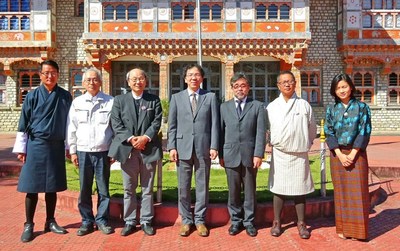
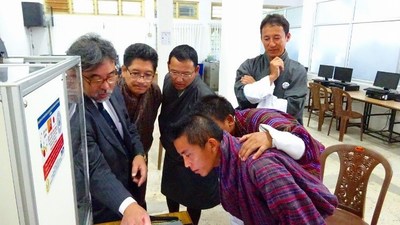
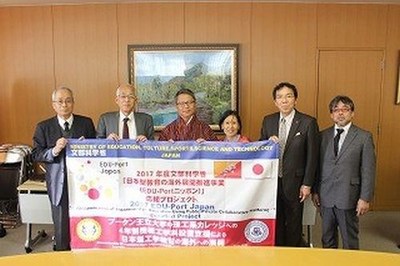
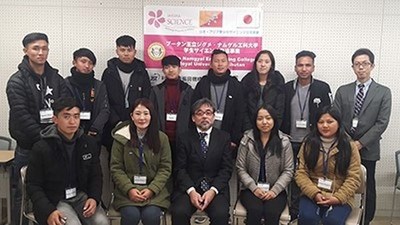
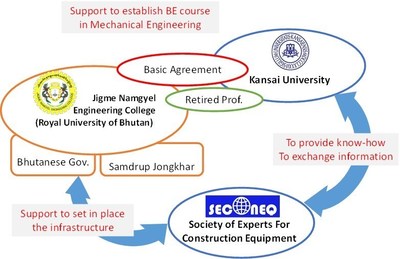
Japan has supported the development of technology and agriculture in Bhutan for the past 50 years. The challenge now is to educate and train enough engineers with the knowledge and experience to maintain equipment and technological know-how that has been assimilated during this time.
"Bhutan does not have enough trained engineers with the appropriate skills to maintain the country's technological infrastructure," explains Junichi Kurata, an associate professor at the Faculty of Engineering Science Department of Mechanical Engineering and the director of the collaboration for Kansai University. "So in 2016 Kansai University signed an agreement with the Royal University of Bhutan to collaborate and support the establishment of a 4-year Bachelor of Engineering in Mechanical Engineering course in Jigme Namgyel Engineering College and nurture students with practical knowledge required to repair and maintain machines and equipment, as well as encouraging them to think about research and development for the future."
The two institutes formally decided to work on launching the 4-year course in engineering in July 2017. The collaboration has been fruitful and in July 2019 they will formally start a 4-year Bachelor of Engineering in Mechanical Engineering at the Jigme Namgyel Engineering College (JNEC), Royal University of Bhutan. This is the first such course in Bhutan.
Overview of the course
The basic aim of the 4-year undergraduate course in Mechanical Engineering at Jigme Namgyel Engineering College (JNEC), Royal University of Bhutan is education to achieve 'technical education for practical applications' based on Japanese-style engineering education emphasizing scientific principles and practical skill learning. "Our approach to teaching will emphasize giving students hands-on experience to develop mechanical engineering," says Kurata. "We donated the 3D printer for such purpose. The students can design and produce parts for various machines thereby gaining deep insights into the construction and structure of machines. Engineering education based on practical training has a long history in Japan and can be traced to the curricula implemented by Henry Dyer and his colleagues who were invited by the Meiji Government to establish tertiary level engineering education programs in Japan."
Background and recent highlights of the collaboration
On 30 June 2016, Kansai University signed an agreement of understanding with Royal University of Bhutan. Following this, there were visits and exchanges by faculty members from both institutes to discuss plans including establishing a new course in engineering. Furthermore, Kansai University received financial support for the "Japan-Asia Youth Exchange Science Exchange Program in Science (Sakura Science Plan)" from the Japan Science & Technology Agency (JST) in 2017, enabling exchange of students and their supervisors. In 2017-2018 the collaboration among Kansai University, Society of Experts for the Construction Equipment (SECONEQ; Representative Director, Mr. Hajime Shirai) and Royal University of Bhutan to establish a new course in the area of science and technology was selected as a "MINISTRY OF EDUCATION, CULTURE, SPORTS, SCIENCE AND TECHNOLOGY-JAPAN- 2017 EDU-Port Japan (Dissemination of Japanese-style Education Using Public-Private Collaborative Plat forms) Supported Project" by MEXT. The Sakura Science Plan was also selected for this year, with plans to start accepting from 17th to 23rd February 2019.
Professor Junichi Kurata Kansai University donated a 3D printer to the Jigme Namgyel Engineering College (JNEC), Royal University of Bhutan. This is the first 3D printer to be installed in Bhutan.
In January 2018 Dr Andu Dukpa, President of Jigme Namgyel Engineering College, Royal University of Bhutan visited Kansai University.
From December 21-27, 2017, 10 students and a teacher from Jigme Namgyel Engineering College (JNEC) of Royal University of Bhutan (RUB) visited Kansai University.
Further information
Junichi Kurata, Faculty of Engineering Sciences,
Kansai University
kurata@kansai-u.ac.jp
General information
International Liaison Group, Kansai University
3-3-35 Yamate-cho, Suita-shi, Osaka 564-8680 JAPAN
EMAIL: kansai-u1886@ml.kandai.jp
Websites
Kansai University
http://www.kansai-u.ac.jp/English/
Kansai University eBulletin
http://www.kansai-u.ac.jp/Kokusai/e-bulletin/
Jigme Namgyel Engineering College (JNEC)
https://www.jnec.edu.bt/

